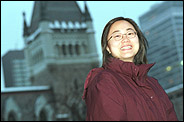Catherine Lu
It's difficult to say if we are closer today to Pierre Trudeau's concept of a just society than we were 30 years ago. But ask political science professor Catherine Lu if our definitions of justice and privacy have progressed, and she'll give you the straight goods.
 PHOTO: Owen Egan
PHOTO: Owen Egan |
|
"Both privacy and justice encompass broad controversial themes. We have seen an evolution in the kinds of rights that we extend to family privacy. Spousal abuse, for instance, is not included in things that should remain limited to family privacy. If we apply that analogy to international relations, we see a changing view about intervention in state affairs, for example, in cases where there are grave human rights violations.
"When you have massive human rights violations, the question is no longer whether to intervene, but how to intervene." These are issues that Lu studied as an undergraduate and master's student at the University of British Columbia, and in her doctoral thesis at the University of Toronto -- where she earned an award for her teaching abilities. "We're now asking ourselves what mechanisms can we use to get justice and reconciliation? And what models of justice are we beginning to formulate at the international level?"
It's a question that Lu will likely spend much time answering in the years to come. Her specialty is political philosophy, specifically the concepts of justice and reconciliation.
She has just embarked on her second semester at the University, teaching a seminar in political theory, and she's already fulfilling one of her goals. Her decision to work at McGill came partly from a desire to contribute to McGill's reputation and presence in political theory, a reputation forged by such formidable figures as Charles Taylor.
For Lu, the model of the International Criminal Court, which advocates a retributive form of justice -- that is, punishment -- is largely inadequate.
"A more restored notion like reconciliation can apply to internal conflicts, like the Truth and Reconciliation Commission in South Africa, but it can also apply to international conflicts. For example, healing the wounds of the Vietnam War between the U.S. and Vietnam would be more productive with reconciliation."
Reconciliation -- when all the parties with a stake in a particular offence come together to resolve collectively how to deal with the aftermath of the offence and its implications for the future -- results in a better form of justice, according to Lu. Its confessional nature delivers justice through a collective account of events.
"In a criminal court, you can't get at the complete truth and rarely get an acknowledgement of guilt. Part of justice is about the bond between people, not just what divides a community."
But what about criminal courts like the Nuremberg Trials?
"Nuremberg was necessary because it served a specific political function," Lu maintains. "It brought to the fore, for the first time, the charge of crimes against humanity. It was precedent-setting in that it showed the international and domestic political realms to be mutually interconnected."
Lu points to contemporary effects of Nuremberg in states that traditionally have been tight-lipped about their own affairs such as China and Russia, who are being pressured into answering charges about human rights abuses.
"In Chechnya, Vladimir Putin and Boris Yeltsin had to justify their military action to the world, and in doing so, had to acknowledge the force of the international community."
With the swearing in of American President George W. Bush, Lu is wary of the changes in attitudes about intervention in the U.S. "The isolationist worry is there. But a bigger worry is Iraq, where the effects of sanctions have devastated the country and caused massive human suffering. Will military isolation be compensated with more aid or concern for the least fortunate? Not likely."
Lu admits that enlightened rhetoric about justice and international relations needs to be translated into action. If there is a solution, she suggests that it's leading by example. "Practice humanity yourself. You have to engage in political discussions and moral conflict. That's why truth is so important."

